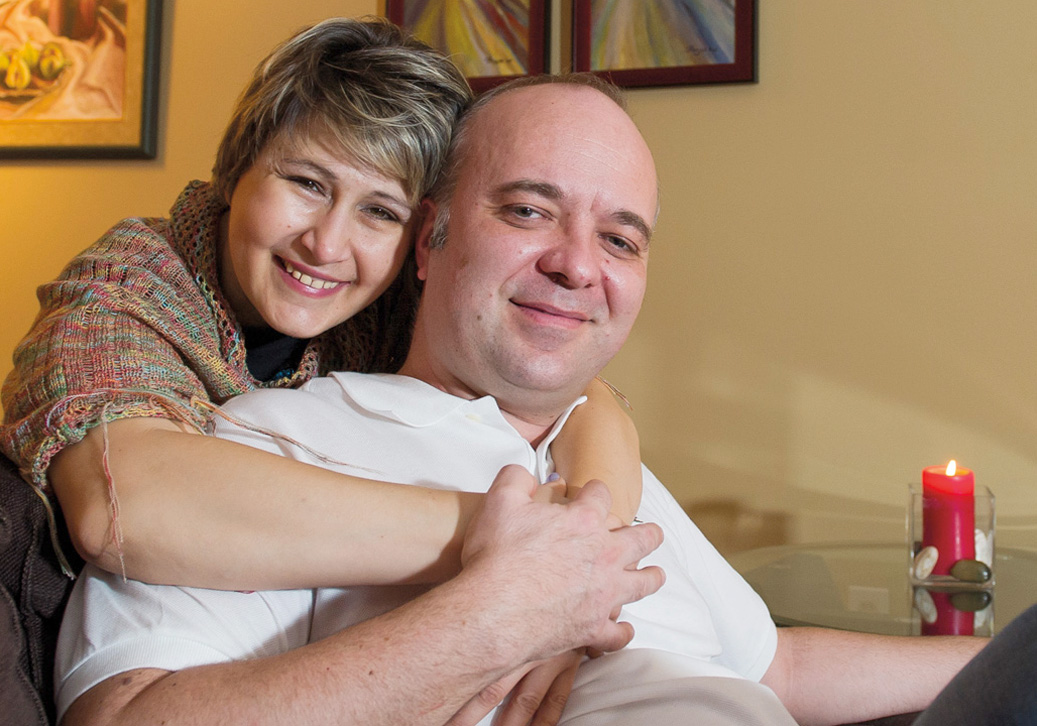A source of ongoing strength
By Anne Bokma
For people with diabetes, their partners, parents, grandparents, siblings, children and friends are often great sources of support. Meet a family which demonstrates this.
Family is not an important thing. It’s everything,” says the Canadian actor Michael J. Fox. For those with diabetes, these words are especially meaningful.
“There is something very special about family for people with diabetes—it’s a lifelong diagnosis and family members will often stand beside you for your lifetime,” says Dr. Jan Hux, chief science officer for Diabetes Canada. She adds that while not everyone may have biological family members they can reach out to in times of need, they can often draw on other circles of support, such as friends or a church group.
A perfect match
Mirjana Rakic credits her husband of 20 years, Dejan, with seeing her through the many diabetes-related challenges she has faced. Mirjana, who is 41, was diagnosed with type 1 diabetes when she was nine, and moved to Canada from Belgrade as a teenager. She returned to Serbia to marry her husband, who later joined her in Vancouver. A former psychiatric nurse and now a volunteer with Diabetes Canada, Mirjana admits she hasn’t always managed her diabetes very well—she used to smoke and neglect her body, and felt her diagnosis was a burden to those around her.
“As a kid I looked at the struggle my family had trying to help me and I felt so guilty,” she says. “I didn’t take care of myself. And I didn’t care about harming myself because I thought that would allow me to die sooner and I wouldn’t be a burden.”
But her parents and her husband stuck by her. “It got to the point where my husband said, ‘I don’t know how to help you anymore and I can’t watch you not take care of yourself.’” That was the wakeup call Mirjana needed. She began seeing a family doctor regularly and worked on making positive changes to her lifestyle, including seeing a spiritual healer, taking up yoga and meditation, journaling and walking regularly.
In 2004, Mirjana experienced chronic renal failure, also known as chronic kidney disease, which meant her kidneys stopped working. As a result, she couldn’t have children and had to stop working two years later. Losing Mirjana’s income as a nurse was a financial challenge, and the couple moved from their townhouse to a one-bedroom apartment in Richmond, British Columbia.
Taking control
In 2011, when Mirjana needed a kidney transplant, her husband was the donor. “He was the perfect match—in more ways than one,” she says. “I am fortunate to have a lot of love around me, especially from my husband, whom I’ve known since I was a teenager. He helped me change my attitude from feeling like a victim to being someone who could take control and responsibility for my diabetes.”
In 2014 Mirjana received a new pancreas, and again she had her family’s support as she underwent this complex surgery. She also had peace of mind and committed herself to expect the best, and today she no longer needs to take insulin. She says, “My husband and parents, and other family and friends, are still in disbelief at how I was able to go through such challenges with grace and humour. I simply could, because my attitude changed to accepting myself as a creator of my life and accepting the consequences of that.”
Anne Bokma is an award-winning freelance journalist from Hamilton, Ontario. Readers can find her blog, “My year of living spiritually,” and other shared insights and selected writings at annebokma.com. She originally wrote this piece for Diabetes Dialogue.














